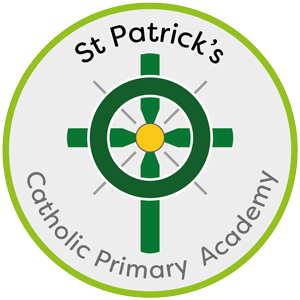Latest News
English at St. Patrick’s
Subject Leader: Mrs Ryan
Phonics Support Leader: Mrs Cox
I would like to introduce myself as Mrs Ryan, English lead here at St. Patrick’s. I believe I have the ability to enthuse and motivate the children here at St. Patrick’s due to my passion, deep knowledge and love of literature.
In every aspect of the curriculum English can be found. Our children need to be confident speakers, listeners, readers and writers and need opportunities to practise these skills in every subject. The English curriculum and the teaching of it has never been more prominent and I am dedicated to ensure that all children leave St. Patrick’s having the knowledge and skills to be literate citizens in our faced paced ever- changing world.
As English lead, the main priority for me, is that our intent of delivering a curriculum that develops a love of reading, writing and discussion. I want my subject to be a medium to transport our pupils to places and contexts outside their realm of knowledge.
Reading for pleasure is fundamental and we want to develop a love of reading widely and often. Early reading is high on our agenda, and we recognise that the early years of a child’s life is crucial. The experiences we offer our children in EYFS and Year 1 are paramount to laying the foundations of future success. Reading interest is sparked in our children from day one and children have picture books to read from nursery, leading to phonic based books and on to more complex novels as they reach KS2 Our phonics scheme of Read Write Inc, allows the children in our Early Years and KS1 to develop the skills they need to access the rest of the Oxford Reading Tree Scheme. Class libraries, daily reading, initiatives to encourage regular reading and celebrations of authors and books are just some of the many experiences we provide for our children.
To ensure that teaching and learning standards are kept high, I monitor classroom practice on a termly basis, giving feedback and support where necessary. Staff have regular professional development to ensure they are providing opportunities to ensure that the children in our school having reached their full potential.
I also practise what I preach. I love to read and do so at every opportunity. I am part of a monthly book club and I am always recommending my favourite reads to colleagues, friends and family. I have many favourite authors, as a child it was Enid Blyton and Roald Dahl and now as an adult I am huge fan of Agatha Christie and the poet Brian Bilston. I would secretly like to be an author but I haven’t put pen to paper…. yet!
Intent
At St. Patrick’s, we believe that a quality English curriculum should develop children’s love of reading, writing and discussion. We aim to inspire an appreciation of our rich and varied literary heritage and a habit of reading widely and often. We recognise the importance of nurturing a culture where children take pride in their writing, can write clearly and accurately and adapt their language and style for a range of contexts. We want to inspire children to be confident in the art of speaking and listening and who can use discussion to communicate and further their learning.
We believe that children need to develop a secure knowledge-base in English, which follows a clear pathway of progression as they advance through the primary curriculum. We believe that a secure basis in literacy skills is crucial to a high- quality education and will give our children the tools they need to participate fully as a member of society.
Our English curriculum links with our whole school curriculum drivers:

Implementation
These aims are embedded across our literacy lessons and the wider curriculum. We have a rigorous and well organised English curriculum that provides many purposeful opportunities for reading, writing and discussion. Teachers use a “Cold to Hot Write” approach, but also ensure that cross curricular links with concurrent topic work are woven into the programme of study. Our curriculum closely follows the aims of the National Curriculum for English 2014.
The national curriculum for English aims to ensure that all pupils:
- read easily, fluently and with good understanding
- develop the habit of reading widely and often, for both pleasure and information
- acquire a wide vocabulary, an understanding of grammar and knowledge of linguistic conventions for reading, writing and spoken language
- appreciate our rich and varied literary heritage
- write clearly, accurately and coherently, adapting their language and style in and for a range of contexts, purposes and audiences
- use discussion in order to learn; they should be able to elaborate and explain clearly their understanding and ideas
- are competent in the arts of speaking and listening, making formal presentations, demonstrating to others and participating in debate.
In addition to daily English lessons, children excel in early reading through the use of the RWI programme from reception to year 2. We use a wide variety of quality texts and resources to motivate and inspire our children. We also provide a wealth of enrichment opportunities, from hosting visiting authors and World Book Day.
Impact
As a result, we have a community of enthusiastic readers and writers who enjoy showcasing their developing literacy knowledge and skills. They are confident to take risks in their reading and writing, and love to discuss and share their ideas.
English Documents
Please view the additional documents in school:
- English Knowledge and Skills Progression
- English Grammar Vocabulary Progression
- English Grammar Knowledge Organisers
- English Genre Knowledge Organisers


